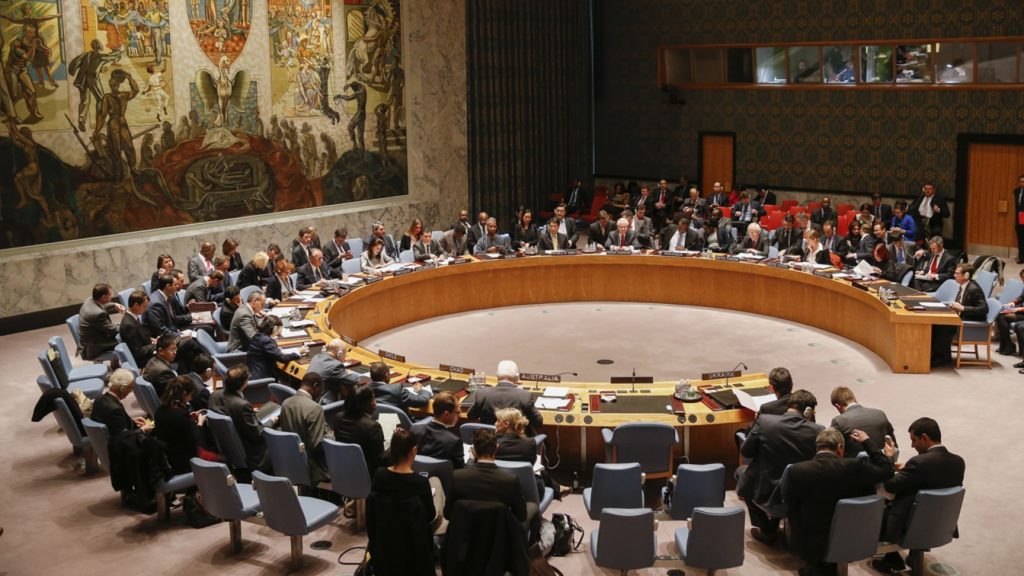Australia/Israel Review
Scribblings: Jerusalem exposes UN absurdities
Dec 21, 2017 | Tzvi Fleischer

Tzvi Fleischer
On Friday, Dec. 8, the UN Security Council convened an “extraordinary debate” to discuss the US Trump Administration’s decision to recognise Jerusalem as Israel’s capital.
This seems like an “extraordinary” thing to do. Why would the Security Council, whose primary role is overseeing the “maintenance of international peace and security” need to discuss the fact that one country recognised another country’s capital?
The explanation offered in a joint statement by France, Italy, Germany, Sweden and Britain, was that the decision was “not in line with Security Council resolutions and is unhelpful in terms of prospects for peace in the region.”
But wait. Russia, also a major international player and a permanent UN Security Council member, recognised west Jerusalem as Israel’s capital in April. Not only did the UN fail to convene any “extraordinary sessions” to discuss Russia’s move, hardly anyone even bothered to publicly criticise the Russian decision. So apparently, the terrible consequences caused by recognition of Israel’s capital only apply when this is done by the US. When Russia does the same thing, it’s fine and dandy.
So calling the “extraordinary debate” in itself illustrated the extent to which absurdities, illogic and political game-playing dominate discussion of Israeli-Palestinian issues at the UN.
The content of the UN Security Council debate on Dec. 8 also illustrated this in a different way.
Hopefully readers of this column are aware that west Jerusalem has been part of Israel since its foundation in 1948 and Israel’s capital since 1949. The primary reason it has not been recognised as Israel’s capital since that time has not been because of any conflict with the Palestinians over land and “occupation”, but because of a long-obsolete element of the UN partition plan of 1947. That plan called for all of Jerusalem, as well as neighbouring Bethlehem, to be a “Corpus separatum” – a separate legal entity under UN control. The UN never made any significant effort to implement this provision, so it has been a dead letter for a very long time.
Yet international diplomats initially hoped a peace deal might include a revival of this internationalised Jerusalem provision, so they refused to recognise Israeli sovereignty in any part of the city. In later decades, it became very obvious this was never going to happen, yet this zombie policy – dead but not buried – gained a strange inertial impetus of its own. To even talk about changing it was impossible because this was seen as endangering peace hopes and likely sparking violence.
Here’s the thing about the Security Council debate on Jerusalem. Lots of speakers and countries – among them, Uruguay, Sweden, France and Nickolay Mladenov, the UN Special Coordinator for the Middle East Peace Process – invoked the partition plan and its long-dead call for an internationalised Jerusalem as a reason one should not recognise any part of Jerusalem as Israel’s capital.
So the UN continues to argue that west Jerusalem is not necessarily Israeli because it might potentially be part of a “corpus separatum”.
Yet UN representatives and diplomats never say the same thing about east Jerusalem, even though that was just as much a part of the proposed “corpus separatum” as west Jerusalem – as indeed was Bethlehem, which is today under full Palestinian Authority control. Those areas are almost always referred to at the UN – including in the recent Security Council debate – as “occupied Palestinian land.”
So the bizarre politics and biases of the UN have led to this blatant logical inconsistency – Israel should not be considered fully sovereign in west Jerusalem because this was once to be part of a proposed “corpus separatum”. Yet even though east Jerusalem and Bethlehem were also part of this “corpus separatum”, no one should imagine that these areas are anything but sovereign Palestinian territory (even though no sovereign Palestinian state has ever yet existed.)
In other words, it should be obvious that supposed international law definitions and interpretations applied by the UN to the Israeli-Palestinian situation are essentially nothing but blatant pretexts to support Palestinian and Arab claims against Israel.
What Jerusalem’s Arab residents think
In this column, I have often dissected the largely positive trends in surveys of Israeli Arab opinion. So what do the Arabs of east Jerusalem – who are largely not even Israeli citizens, only permanent residents – think about their situation under Israeli rule?
While not as positive as for the Arab minority in Israel, a poll done in September by the newspaper Israel Hayom found there is a decent base for Israel to build on also among Arab residents of Jerusalem. Forty-two percent said they felt a sense of belonging to Israeli society; 33% even said they were proud to be Israeli; 46% said they view the Israeli police positively; and 43% said they recognise the historical and religious connection between the Jewish people and the land of Israel.
Now the truth is, Arab Jerusalemites have a lot to complain about. Their neighbourhoods generally have much poorer services and infrastructure than Jewish ones do.
This reality is a result in part of the fact that it is anathema in these communities both to vote in Jerusalem’s municipal elections or to have too much to do with municipal authorities. Even those who feel a belonging to Israeli society cannot act on this for fear of violence and ostracism from their neighbours, who demand everyone reject any cooperation with the Jewish “occupiers”.
Yet integration is increasing. Another recent study shows 50% of Arab Jerusalemites work for Jewish employers, and growing numbers of young Jerusalem Palestinians are attending Israeli universities.
If Israel can better tackle the inequalities in services and infrastructure, there is no reason improved integration and coexistence cannot be the main trends of the future for Jerusalem.
Tags: Israel






